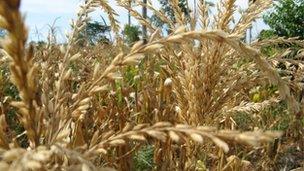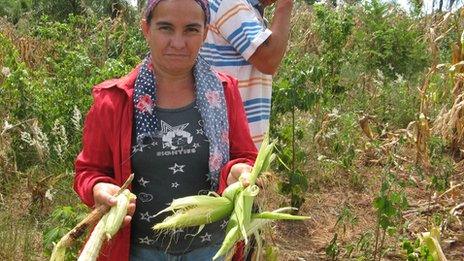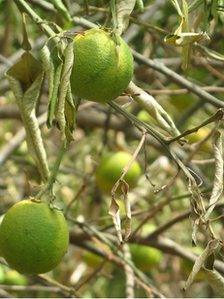Praying for rain in Paraguay
- Published

The government estimates about 250,000 small-scale farmers are at risk
A severe drought is threatening the livelihood of thousands of small farmers across Paraguay. The BBC's Vladimir Hernandez visited one family to see how they are affected.
Rosa is hoping for a miracle. She has barely seen any rain since October and has lost almost all of her crops.
She and her husband, Gregorio, earn some cash from their field of six hectares. But crucially most of their crops are used to feed themselves and their two children.
Now Rosa is desperate for some rain to salvage whatever they can grow before the winter arrives in April. Otherwise they don't know how they are going to eat.
Their plight is typical of the critical situation facing thousands of small farmers in Paraguay as the country endures one of the worst droughts in its history.
Several countries in the south of Latin America have been feeling the lack of rain. Experts say it is caused by La Nina, the meteorological phenomenon where falling sea temperatures cause unusual weather patterns.
But Paraguay is the worst-affected country. Unlike neighbours Brazil, Argentina and Uruguay, its main income comes from agriculture and cattle farming, both severely damaged by the drought.
The government estimates that up to 60% of the nation's crops could already have been lost.
The private sector says that total damages could be at least $1.5bn (£950m).
For a country with almost half the population in poverty, and ranked among the poorest in Latin America by the United Nations, such a figure is a huge blow.
Grim prospects
"We definitely need some rain now, or we won't have anything to eat," says Rosa at her small farm about 100km (62 miles) from the capital, Asuncion.
She takes us to see her crops, or what is left of them.

Rosa Aquino shows how the drought has affected her maize crop
We are shown a shadow of what normally is a thick cornfield. But because of the drought most of the plants are yellow, their leaves rustling in the wind. It is a sad sight.
Rosa rips apart one of the corn plants. She finds a small knob, its seeds affording no hope.
Despite the grim prospects, Rosa tries to keep her spirits high.
"If we could just get some rain before April, when the winter begins, then we could still salvage something. Otherwise the season will end and we will have nothing," she says.
The Paraguayan government estimates that there are about 250,000 small-scale farmers like Rosa Aquino and her husband who are at serious risk because of the drought.
"The medium and big farms have enough resources to cope with the situation, not so much the small farmers who are the priority for this government," says Edgar Mayeregger, director of the ministry of agriculture's risk department.
Its figures show the agricultural sector grew by 50% in 2010, mainly due to the soaring demand for soy beans from markets like China and India.
But, with the lack of rain, soy production is expected to fall by nearly a half.
"This is terrible news for our country as it will stop the growth we have had in recent years. Initial estimates are already indicating that the 4.8% growth expected from the economy in 2012 will be halved," says Mr Mayeregger.
Farm animals are also at risk, in particular cattle.
Paraguay is one of the top 10 beef exporters in the world. But the drought is hitting a sector already suffering losses from a foot-and-mouth outbreak last year that caused a drop of 16.5% in exports in 2011.
The consequences of the drought in agriculture and cattle farming can be devastating, as both sectors represent about half of the country's economy.
High costs
Paraguay is still not in recession, although the longer the drought lasts the quicker the country could slip into the red.

Orange trees are wilting because of a lack of water
But the consequences of the lack of rain can already be felt.
"When there is a drought, things immediately get more expensive in the market," says Rosa.
The government declared a food security emergency last month, in an attempt to guarantee that those most affected in rural areas would be able to feed their families.
In the urban areas of Paraguay, like the capital Asuncion, locals say that the cost of living has been rising as the losses in agriculture have gown.
"This may not be the worst drought ever seen, but it could bring the worst ever damage to our economy," says Mr Mayeregger.
"The nation's income is at risk and that is very worrying."
While in recent days there have been some scattered showers in Paraguay, experts believe it has not been enough to improve the situation.
In the summer season - between November and March - the average monthly rainfall is more than 150mm. But this summer it has been barely 10% of this figure.
Also, temperatures this time of the year can be more than 40C during the day and the few drops that fall on the ground quickly evaporate.
"Sadly, nobody controls the rain," says Rosa.
As she keeps watching the sky, blocking the powerful light of the sun with her hand, she adds: "All we can do is wait."
- Published3 February 2011